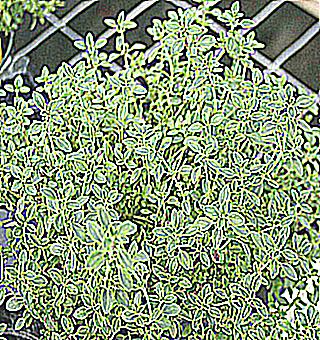Home >
Erectile Dysfunction >
Thyme for potency
Thyme for potency

Thyme (thyme) is a medicinal perennial plant that grows in the form of a semi-shrub up to 40 cm in height. It has small green leaves of a rounded shape and small pinkish-purple inflorescences. The thin trunk of the shrub grows near the ground. After flowering (June-July), nuts ripen on the stems (August-September).
Thyme prefers to be in a temperate climatic zone, willingly spreads in dark places with a lot of sandy soil.
Thyme composition
In addition to a large amount of water and dietary fiber, the chemical composition of the plant includes the following valuable ingredients:
- vitamins (beta-carotene, riboflavin and thiamine, niacin and pyridoxine)
- organic acids (ascorbic, pantothenic and folic, ursolic and oleic)
- macronutrients (phosphorus , potassium and magnesium, sodium and calcium)
- trace elements (selenium and copper, iron and zinc, manganese)
- resins, gums and fats
Useful properties of thyme
A medicinal substance based on herbal components is used in medicine, as well as in the cosmetic and food industries. Thyme is known to specialists in traditional medicine as an effective remedy that has a wound healing, antiseptic and disinfectant effect.
Help with respiratory system diseases
Reception of infusions, teas and syrups based on a medicinal herbal plant relieves cough, relieves inflammation. The components of the herbal remedy fight edema and pain. The systematic use of drinks prepared on the basis of thyme makes a person more resistant to such dangerous diseases as whooping cough, asthma and tuberculosis.
Help with gastrointestinal lesions
The plant helps to facilitate the digestion of hard-to-digest foods, such as sausages and fatty meats, legumes and potatoes. Thyme ensures disinfection of the mucous membrane of the larynx and oral cavity, slows down carious destruction of tooth enamel. The herb helps to improve well-being for bowel cramps and bloating. In addition, thyme freshens breath and relieves bad breath due to its pronounced spicy aroma. The medicinal plant is often used as an astringent when it is necessary to cope with gastrointestinal disorders (diarrhea, flatulence).
Help with reduced potency
A decoction of thyme is recommended for males who wish to recover from impotence caused by psychogenic causes. The plant stimulates the activity of nerve cells, provides prompt elimination of symptoms of depression, chronic fatigue and neurasthenia. In addition, regular intake of tea with thyme helps to prolong the total length of sexual intercourse. The plant helps to avoid premature ejaculation, reduces the likelihood of infertility.
Help for disorders of the musculoskeletal system
Thyme has a pronounced analgesic and anti-inflammatory effect, helping patients with articular and muscular rheumatism. Valuable ingredients of the herb actively fight the effects of bruises, scratches and abrasions.
Contraindications
A medicinal product based on herbal ingredients is not recommended for some patients, in particular:
- persons with hypersensitivity to thyme
- patients who have gastritis or ulcerative lesions of the stomach and duodenum
- patients with diabetes
< li>patients with cerebral atherosclerosis - patients suffering from thyroid dysfunction (hypothyroidism)
- persons who are in pre-infarction state or have recently suffered from a severe attack of myocardial infarction
- patients diagnosed with atrial fibrillation or cardiac decompensation
- patients with severe organic disorders of the liver and kidneys
- persons suffering from symptoms of cardiosclerosis
Patients who show signs of a severe mild disorder (tuberculosis, asthma or pneumonia) should take medications with thyme in strictly limited quantities. Reception of an excessive amount of medicinal decoctions and tinctures can provoke a complication of the disease and cause the need for urgent medical attention. Abuse of thyme-based medicinal substances can cause miscarriage. That is why women who are in a state of pregnancy need to limit the intake of this medicinal plant. If a pregnant woman uses products with the addition of thyme, then the necessary therapeutic procedures should be carried out in accordance with the recommendations of the attending physician.



























